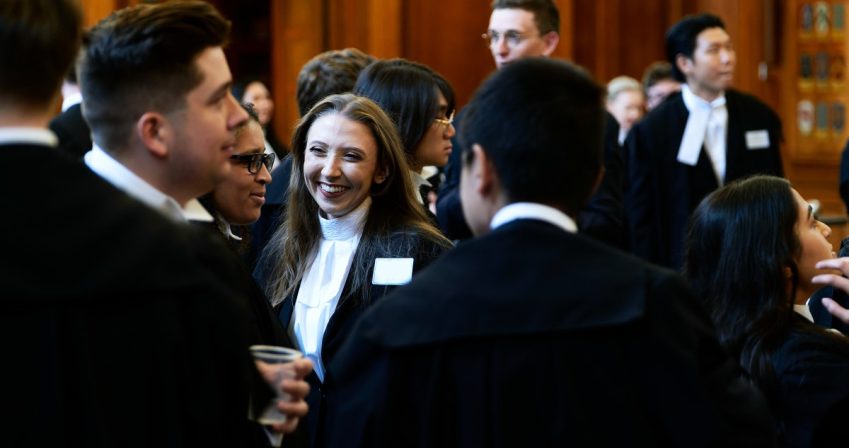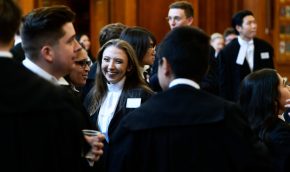The Inn will:
Education
- Call to the Bar
- Education & Training Policies
- Professor The Hon George Hampel AM KC
- In Conversation: The Lady Chief Justice and Chair of the Bar
- International Practice Panel
- Munich – Why?
- 1500-2023 - Snapshots of The Inner Temple Library
- The Appeal Court of the Archbishop of Canterbury - The Court of Arches: Ancient and Modern
- Dr Ivy Williams, An Enduring Inspiration to Women Lawyers
- Gilds and Things
- The History of The Inner Temple through its Treasures
- Human Rights in Britain and France: From Thomas Becket to the French Revolution
- Law in a Time of Plague - Was the Law a Good Doctor
- Lawyers and Diplomats
- Paradise Lost and Found
- Religious Disputes and the Custody of Children: Dr Barnardo in the House of Lords
- The Selden Society: “A Scotsman caught young” – The influences which shaped Lord Mansfield
- The Selden Society: John Selden and Legal History
- The Selden Society: The Fire Courts
- The Smirkes and The Inner Temple
- Sub-Treasurers of The Inner Temple
- Treasures from the Library
- William Crashawe's Library
- The Winding Stair: Inside the bitter rivalry of Edward Coke and Francis Bacon
- Master H Meets...Again
- Have We "Had Enough of Experts"?
- Race and the Legal Profession
- The Absolute Ban on Assisted Dying and Lessons from Canada
- Assumptions of Responsibility
- Brain Imaging as Evidence
- Calling It Out: Professionals, their Regulators, Equity and Fairness
- The Bar of Ireland, Brexit and the Common Law
- The English Approach to Deciding Commercial Cases
- The Executive and the Courts in the Constitution
- Experts: Love or Loath? The Involvement of Experts in Legal Proceedings
- Forensic Document Examination - The Science Today
- Forensic Identification from the Hand
- The Future for Regulation of the UK Public Markets
- The Future of AI in the Justice System A Principled and Practical Approach
- Giving Judges a Voice in Democracies
- The History of the Law Officers
- How the Law Should Respond to External Crises Such as COVID-19
- Lawyer or Politician: What is the Attorney General?
- The Limits of Fiduciary Rules
- Memory as Evidence
- Politics and the Law
- The Predicament and Agency of Refugees
- Previous Lecture Series and Speakers
- Proof in International Criminal Trials
- Reforming the Law of Contempt of Court
- A Public Health Approach to Equality Law
- The Role of the Medical Examiner
- 'Sales' on Retention of Title Terms
- Show me the money!
- Sport - Law and Ethics
- To Prorogue or not to Prorogue – Miller II and Mackinnon v Canada
- The Wild and Ridiculous Doctrine of Equality
- What Does It Mean to Be Anti-Racist in a Profession Full of Privileged People?
- The Work of UNIDROIT and the Future for the International Harmonisation of Commercial Law
- Perverse Not Guilty Verdicts Should Remain Final
- AI: Risks and Benefits
- Assisted Dying
- Asylum and Immigration: Do Sovereign Island Nations have a Duty to Provide Refuge?
- Britain's Unwritten Constitution
- The Crime of Ecocide
- Do Magnitsky Type Sanctions Develop the Rule of Law?
- Does the Bar Need to Communicate and Market Itself More in the Modern World?
- Environmental Law: Regulation and the Right to Protest
- Global Responses to the Forcibly Displaced
- Handing Back the Past: Cultural Repatriation
- Is the Presumption of Innocence Alive and Well?
- Is the Rise in Mass Litigation distorting our Legal System and the UK Economy?
- Is Anything More Needed to Ensure Freedom of Speech?
- Is There a Case for Anonymity in Social Media?
- Is Our Adversarial System Fit for Purpose?
- Is it Better to Review or Monitor Terror Laws? The UK and Australian Positions Compared
- Peace vs Justice
- Prison Reform
- The Rule of Law in Times of International Conflict
- Should UK Judges and ex-Judges Be Sitting in Hong Kong?
- Should our Constitution Protect Against Party Elected Leaders?
- Ukraine War: Peace-making Ahead – Traditional Methods of Accountability or New Solutions?
- Special Gandhi Lecture
- What Does a Master of the Bench Do?
- Frequently asked questions
Home › Education › Education & Training Strategy › Strategic Priorities › Being Inclusive
Being Inclusive
- Design and deliver educational events that cater for the needs of members irrespective of location.
- Ensure that our education activities reflect the variety of practice areas at the Bar.
- Attract talented individuals to the Bar from currently underrepresented groups through realistic, responsible and transparent outreach activities.
- Support our student societies to be inclusive, accessible and welcoming to all.
- Strive for equitable scholarship results through processes that that are fair and transparent, while optimising the use of available scholarship funds.
The Inn recognises the need to develop and maintain a diverse membership where all are welcome. Some members are employed and others self-employed. Some are based in London while others are based on Circuit. We will strive to ensure that all members feel valued.
The use of technology to offer hybrid events has vastly improved access to our educational content for members on Circuit. However, we recognise that the virtual learning experience is different to having an opportunity to network and discuss experiences in person. We will design and deliver events to achieve the aims of the relevant activities whilst also improving the experience for all. We will undertake to seek feedback where appropriate and use this to modify our approaches.


Our outreach activities will continue to focus upon dispelling myths that the profession remains the preserve of the elite. However, we will also be realistic with our messaging and explain that it is challenging to secure pupillage given the mismatch between applicants and available pupillages and tenancies. We will continue to develop an inclusive approach that targets underrepresented groups and provides the necessary insight, demystifying the Bar and building confidence.
Our scholarships make a vast difference to the lives of many who could not otherwise afford to study for a career at the Bar. We will continually review our processes to ensure they recognise potential irrespective of background and that financial awards support those with greatest need.
Our student societies are the beginning of a lifelong collegiate experience within the Inn. We will continue to work with them to ensure they are a stepping stone to an enduring connection with the Inn and its members, ideally linked into future volunteering and supporting other members. They are also a valuable way to develop our students’ key skills preparing them for practice.